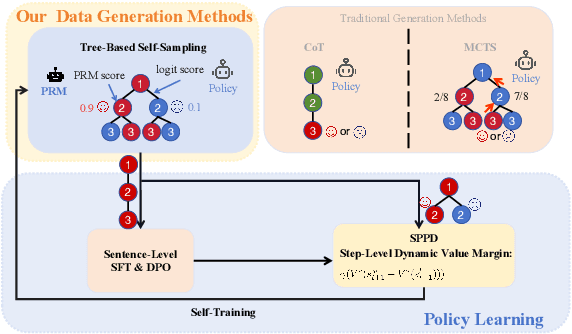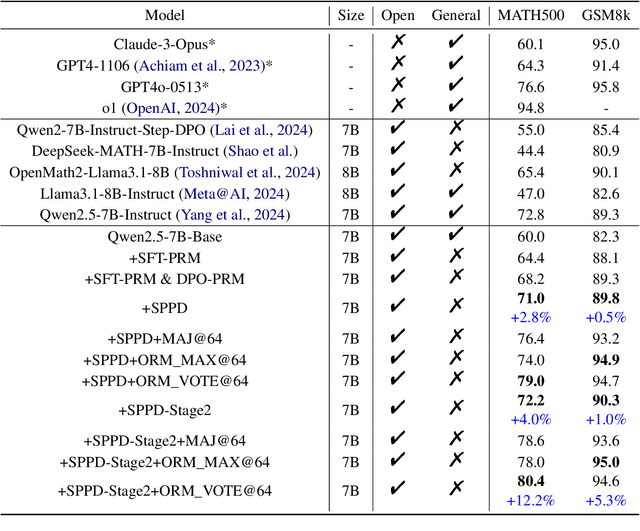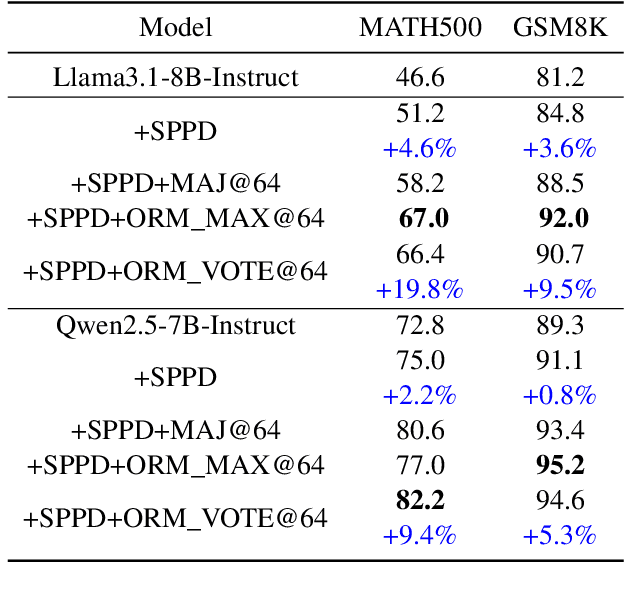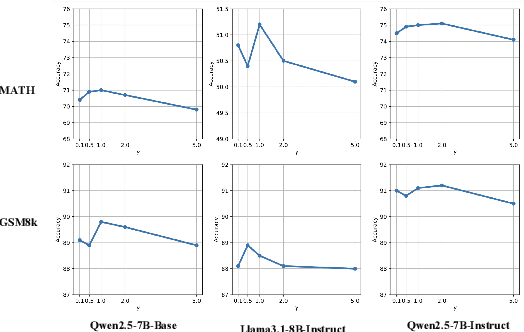Hao Yi
Learn More with Less: Uncertainty Consistency Guided Query Selection for RLVR
Jan 30, 2026Abstract:Large Language Models (LLMs) have recently improved mathematical reasoning through Reinforcement Learning with Verifiable Reward (RLVR). However, existing RLVR algorithms require large query budgets, making annotation costly. We investigate whether fewer but more informative queries can yield similar or superior performance, introducing active learning (AL) into RLVR. We identify that classic AL sampling strategies fail to outperform random selection in this setting, due to ignoring objective uncertainty when only selecting by subjective uncertainty. This work proposes an uncertainty consistency metric to evaluate how well subjective uncertainty aligns with objective uncertainty. In the offline setting, this alignment is measured using the Point-Biserial Correlation Coefficient (PBC). For online training, because of limited sampling and dynamically shifting output distributions, PBC estimation is difficult. Therefore, we introduce a new online variant, computed from normalized advantage and subjective uncertainty. Theoretically, we prove that the online variant is strictly negatively correlated with offline PBC and supports better sample selection. Experiments show our method consistently outperforms random and classic AL baselines, achieving full-dataset performance while training on only 30% of the data, effectively reducing the cost of RLVR for reasoning tasks.
AMAP Agentic Planning Technical Report
Dec 31, 2025Abstract:We present STAgent, an agentic large language model tailored for spatio-temporal understanding, designed to solve complex tasks such as constrained point-of-interest discovery and itinerary planning. STAgent is a specialized model capable of interacting with ten distinct tools within spatio-temporal scenarios, enabling it to explore, verify, and refine intermediate steps during complex reasoning. Notably, STAgent effectively preserves its general capabilities. We empower STAgent with these capabilities through three key contributions: (1) a stable tool environment that supports over ten domain-specific tools, enabling asynchronous rollout and training; (2) a hierarchical data curation framework that identifies high-quality data like a needle in a haystack, curating high-quality queries with a filter ratio of 1:10,000, emphasizing both diversity and difficulty; and (3) a cascaded training recipe that starts with a seed SFT stage acting as a guardian to measure query difficulty, followed by a second SFT stage fine-tuned on queries with high certainty, and an ultimate RL stage that leverages data of low certainty. Initialized with Qwen3-30B-A3B to establish a strong SFT foundation and leverage insights into sample difficulty, STAgent yields promising performance on TravelBench while maintaining its general capabilities across a wide range of general benchmarks, thereby demonstrating the effectiveness of our proposed agentic model.
CoT-Space: A Theoretical Framework for Internal Slow-Thinking via Reinforcement Learning
Sep 04, 2025Abstract:Reinforcement Learning (RL) has become a pivotal approach for enhancing the reasoning capabilities of Large Language Models (LLMs). However, a significant theoretical gap persists, as traditional token-level RL frameworks fail to align with the reasoning-level nature of complex, multi-step thought processes like Chain-of-Thought (CoT). To address this challenge, we introduce CoT-Space, a novel theoretical framework that recasts LLM reasoning from a discrete token-prediction task to an optimization process within a continuous, reasoning-level semantic space. By analyzing this process from both a noise perspective and a risk perspective, we demonstrate that the convergence to an optimal CoT length is a natural consequence of the fundamental trade-off between underfitting and overfitting. Furthermore, extensive experiments provide strong empirical validation for our theoretical findings. Our framework not only provides a coherent explanation for empirical phenomena such as overthinking but also offers a solid theoretical foundation to guide the future development of more effective and generalizable reasoning agents.
SPPD: Self-training with Process Preference Learning Using Dynamic Value Margin
Feb 19, 2025



Abstract:Recently, enhancing the numerical and logical reasoning capability of Large Language Models (LLMs) has emerged as a research hotspot. Existing methods face several limitations: inference-phase techniques (e.g., Chain of Thoughts) rely on prompt selection and the pretrained knowledge; sentence-level Supervised Fine-Tuning (SFT) and Direct Preference Optimization (DPO) struggle with step-wise mathematical correctness and depend on stronger models distillation or human annotations; while Reinforcement Learning (RL) approaches incur high GPU memory costs and unstable training. To address these, we propose \textbf{S}elf-training framework integrating \textbf{P}rocess \textbf{P}reference learning using \textbf{D}ynamic value margin (SPPD). SPPD leverages a process-based Markov Decision Process (MDP) and Bellman optimality equation to derive \textbf{dynamic value margin} on step-level preference optimization, which employs tree-based self-sampling on model responses \textbf{without any distillation} from other models. Furthermore, we theoretically prove that SPPD is \textbf{equivalent to on-policy policy gradient methods} under reward constraints. Experiments on 7B-scale models demonstrate superior performance across in-domain and out-domain mathematical benchmarks. We open-source our code at \href{https://anonymous.4open.science/r/SSDPO-D-DCDD}{https://anonymous.4open.science/r/SPPD-DCDD}.
Video-Text Dataset Construction from Multi-AI Feedback: Promoting Weak-to-Strong Preference Learning for Video Large Language Models
Nov 25, 2024



Abstract:High-quality video-text preference data is crucial for Multimodal Large Language Models (MLLMs) alignment. However, existing preference data is very scarce. Obtaining VQA preference data for preference training is costly, and manually annotating responses is highly unreliable, which could result in low-quality pairs. Meanwhile, AI-generated responses controlled by temperature adjustment lack diversity. To address these issues, we propose a high-quality VQA preference dataset, called \textit{\textbf{M}ultiple \textbf{M}ultimodal \textbf{A}rtificial \textbf{I}ntelligence \textbf{P}reference Datasets in \textbf{V}QA} (\textbf{MMAIP-V}), which is constructed by sampling from the response distribution set and using an external scoring function for response evaluation. Furthermore, to fully leverage the preference knowledge in MMAIP-V and ensure sufficient optimization, we propose \textit{\textbf{Iter}ative \textbf{W}eak-to-\textbf{S}trong \textbf{R}einforcement \textbf{L}earning from \textbf{AI} \textbf{F}eedback for video MLLMs} (\textbf{Iter-W2S-RLAIF}), a framework that gradually enhances MLLMs' alignment capabilities by iteratively updating the reference model and performing parameter extrapolation. Finally, we propose an unbiased and information-complete evaluation scheme in VQA evaluation. Experiments demonstrate that MMAIP-V is beneficial for MLLMs in preference learning and Iter-W2S-RLAIF fully exploits the alignment information in MMAIP-V. We believe that the proposed automatic VQA preference data generation pipeline based on AI feedback can greatly promote future work in the MLLMs alignment. \textbf{Code and dataset are available} \href{https://anonymous.4open.science/r/MMAIP-V_Iter-W2S-RLAIF-702F}{MMAIP-V\_Iter-W2S-RLAIF-702F}.
TSO: Self-Training with Scaled Preference Optimization
Aug 31, 2024



Abstract:Enhancing the conformity of large language models (LLMs) to human preferences remains an ongoing research challenge. Recently, offline approaches such as Direct Preference Optimization (DPO) have gained prominence as attractive options due to offering effective improvement in simple, efficient, and stable without interactions with reward models. However, these offline preference optimization methods highly rely on the quality of pairwise preference samples. Meanwhile, numerous iterative methods require additional training of reward models to select positive and negative samples from the model's own generated responses for preference learning. Furthermore, as LLMs' capabilities advance, it is quite challenging to continuously construct high-quality positive and negative preference instances from the model's outputs due to the lack of diversity. To tackle these challenges, we propose TSO, or Self-Training with Scaled Preference Optimization, a framework for preference optimization that conducts self-training preference learning without training an additional reward model. TSO enhances the diversity of responses by constructing a model matrix and incorporating human preference responses. Furthermore, TSO introduces corrections for model preference errors through human and AI feedback. Finally, TSO adopts iterative and dual clip reward strategies to update the reference model and its responses, adaptively adjusting preference data and balancing the optimization process. Experimental results demonstrate that TSO outperforms existing mainstream methods on various alignment evaluation benchmarks, providing practical insight into preference data construction and model training strategies in the alignment domain.
 Add to Chrome
Add to Chrome Add to Firefox
Add to Firefox Add to Edge
Add to Edge